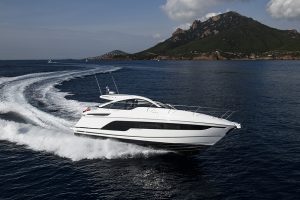Safety warning issued after fatal boiler explosion on the Manhattan Bridge container ship
The Marine Accident Investigation Branch (MAIB) has issued a safety warning following an investigation into the explosion on the Manhattan Bridge, which left one man dead and another treated for burns
30 June 2017
Users of low sulphur marine gas oil are being advised to monitor it closely when used in cold temperatures following a fatal boiler furnace explosion on board a container ship in January 2017.
The ship’s engine room oiler, 35-year-old Celso Banas from the Philippines, died of multiple injuries during the explosion on the Japan-registered Manhattan Bridge.
The second engineer suffered severe burn injuries to his face and right arm, which required a skin graft.
At the time of the incident, the ship was berthed alongside a container terminal in Felixstowe.
The Marine Accident and Investigation Branch (MAIB) has carried out an initial accident site investigation and has now issued a safety bulletin.
It said Banas and the second engineer had been investigation a boiler flame failure alarm when the explosion happened.
Investigators identified that in the hours leading up to the accident, the auxiliary boiler had cut out several times due to flame or ignition failures, and on each occasion, the fault was investigated and the boiler reset by the second engineer.
“The boiler explosion occurred while the second engineer and the oiler were trying to restart the boiler burner unit following a flame failure cut-out. The force of the explosion blew open the boiler burner unit door and propelled the burner’s air diffuser into the engine room,” states the MAIB.
Manhattan Bridge had been operating in the North Sea Sulphur Emission Control Area (SECA) for several days prior to the accident.
In order to comply with international emissions control standards, the auxiliary boiler fuel supply had been switched from heavy fuel oil (HFO) to marine gas oil (MGO)
Continued below…
Tripper boat Surprise grounded off the Isles of Scilly due to lack of passage planning
The Marine Accident Investigation Branch also found that the issuing of local boatman's licenses by the Council of the Isle…
Video: Fisherman airlifted after boat fire off Land’s End
Watch the dramatic moment a fisherman is airlifted to safety after his boat caught fire off the coast of Land's…
Boat Fire Safety Week: staying safe on board
Although the number of boat fires is relatively rare in the UK, the fire brigade says they quite often have…
Following the incident, examination of the boiler fuel system by the burner unit manufacturer identified the build-up of waxy deposits in the supply filter, sufficient to restrict the fuel flow.
The MAIB says industry reports indicate an increased incidence of boiler and marine diesel engine performance problems in colder waters following the implementation of the more stringent sulphur emissions limit.
This has been attributed to the increased paraffin content found in some marine gas oils and the subsequent formation of waxy deposits or crystals as the fuel temperature falls which can cause “intermittent and incomplete combustion to the point of flame failure”.
Marine gas oil is tested for use in cold water conditions, but prior to March 2017, the industry standard was to test for what is known as the PP – the lowest temperature at which the fuel will continue to flow when cooled.
The MAIB is recommending that two further tests are now carried out which will look for amongst other things, the temperature when wax crystals start to visibly form in the fuel and a transparent fuel becomes cloudy or hazy.
It says the marine gas oil loaded on the Manhattan Bridge was only subjected to the PP test, as per regulations at the time.
The MAIB is recommending that when operating in cold climates, the risk of waxy residue developing in the vessel’s fuel lines can be controlled by:
● Closely monitoring the visual appearance of low sulphur MGO bunkers for signs of wax precipitation.
● Conducting regular fuel filter inspections and close monitoring of fuel system pressures.
● Maintaining the temperature of the low sulphur MGO in the vessel’s tanks and pipework above the CP and CFPP temperatures to avoid the possibility of filter blocking.
It says the addition of cold-flow improver chemicals to the low sulphur MGO in the vessel’s storage tanks should only be considered as a last resort under the strict guidance of an additive supplier.
27 April 2017
Celso Banas died of multiple injuries following the explosion in the Manhattan Bridge’s boiler room, an inquest has heard.
The 35-year-old sailor was working on the Japanese-registered ship while it was docked at the Felixstowe Container Terminal.
A second man suffered serious burns as a result of the incident and needed hospital treatment.
An investigation into the blast by the Maritime and Coastguard Agency and Suffolk Police is still ongoing.
The Marine Accident Investigation Branch is also looking at the details surrounding the incident, which took place just before midnight on 19 January.
Witnesses described hearing the blast up to 10 miles away.
The full inquest will take place in July.
24 January 2017
The Marine Accident Investigation Branch (MAIB) is examining the Manhattan Bridge container ship after a fatal explosion left one man dead.
The vessel was docking at the Felixstowe Container Terminal when the incident happened in the vessel’s boiler room.
One crew member died as a result of the explosion. Another is receiving treatment in hospital for serious burns.
The accident happened at around 11pm on 19 January 2017.
In a statement released yesterday, the MAIB said: “The MAIB has started an investigation into last week’s auxiliary boiler explosion in the engine room of the container vessel Manhattan Bridge.”
“The vessel was berthing at Felixstowe Container Terminal at the time. One crew member died and another sustained serious injuries.”
The noise of the explosion could be heard by residents living close to the Port of Felixstowe.
Speaking to the Ipswich Star, Mark Mitchell said: “I was standing at my front door having last smoke before going to bed then I heard the explosion clearly in the distance, my wife who was in bed also heard it through the double glazing.”
Baz O’Connell lives opposite the port.
“There was just a very loud bang. You hear noises all the time where they drop containers but this was a much louder noise than normal,” he told the BBC.
“I live in a caravan opposite the docks so it woke me up,” he added.
Police and ambulance crews attended the scene.
A spokesman for Suffolk Police said: “Police were called to the Port of Felixstowe at 11:45pm last night, Thursday 19 January, to reports of an incident in the boiler room of a ship that was docking.”
“One person has sadly died as a result of this incident and another is currently in hospital receiving treatment. The death is not being treated as suspicious and there will be a joint investigation between the Police and the Maritime and Coastguard agency,” the spokesman added.
The Manhattan Bridge container ship was built in 2015 and sails under the flag of Japan.
Its home port is listed as Kobe.












